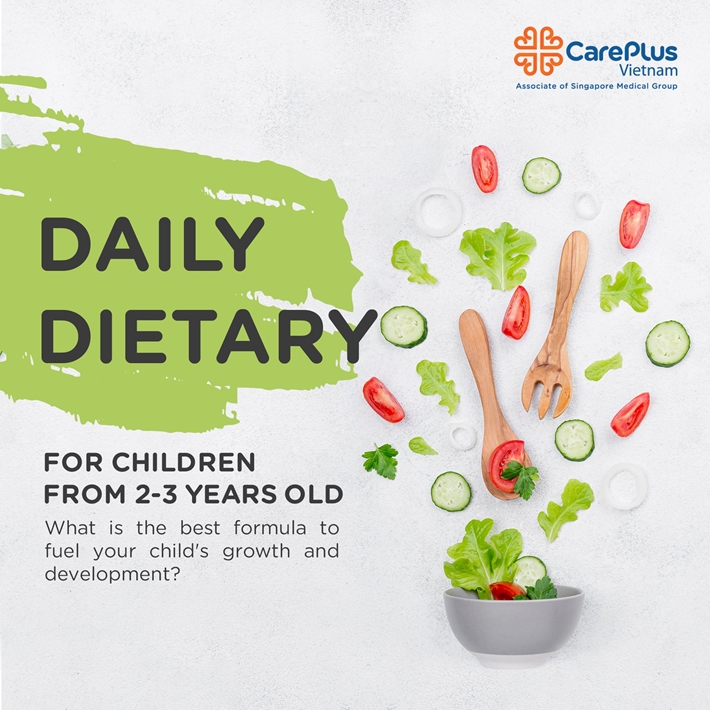Daily dietary guidelines for children 2-3 years
You want your child to eat healthy foods, but do you know which nutrients are necessary and in what amounts? Here's a quick overview.

10/1/2020 2:09:20 PM
Nutrition for kids is based on the same principles as nutrition for adults. Everyone needs the same types of nutrients — such as vitamins, minerals, carbohydrates, protein, and fat. Children, however, need different amounts of specific nutrients at different ages.
So what's the best formula to fuel your child's growth and development? Check out these nutrition basics for girls and boys at 2-3 ages.
Toddlers need a wide variety of healthy foods. You decide what your toddler eats from the five food groups. She decides whether to eat and how much. Think about what she eats each week, rather than each day.
Toddler appetites vary from day today. Suggested daily serves are 1 serve of fruit; 2½ serves of vegies; 1½ serves of dairy; 4 serves of grains; and 1 serve of lean meats, nut pastes, and legumes.
Toddlers need lots of water – the cheapest, healthiest, and most thirst-quenching drink. Offer extra water on hot or humid days. Avoid soft drinks, fruit juices, flavoured milk and water, sports drinks and energy drinks.
Food groups: daily serves of fruit, vegetables, cereals and grains
Fruit: 1 serve = 1 medium apple, banana, orange or pear; or 2 small plums, kiwi fruits or apricots; or 1 cup diced or canned fruit (no added sugar). Offer 1 serve a day.
Vegetables: 1 serve = ½ medium potato (or sweet potato or corn); or ½ cup cooked veggies (broccoli, spinach, carrots, pumpkin); or 1 cup green leafy or raw salad vegies; or ½ cup cooked, dried, or canned beans or lentils. Offer 2½ serves a day.
Food groups: daily serves of dairy, protein, and healthy fats
Dairy: 1 serve = 1 cup (250 ml) milk; or 1 cup dairy alternative like soy or rice milk with at least 100 mg of added calcium per 100 ml; or 2 slices cheese; or ¾ cup (200 gm) yoghurt; or ½ cup ricotta cheese. Choose mostly reduced-fat dairy. Offer 1½ serves a day.
Meat, fish, poultry, eggs, nuts, legumes: 1 serve = 65 gm cooked lean beef, lamb, veal or pork; or 80 gm cooked lean chicken or turkey; or 100 gm cooked fish fillet or 170 gm cooked tofu or 2 large eggs; or 1 cup cooked lentils, chickpeas or canned beans; or 1½ tablespoons nut pastes and spreads (whole nuts can be a choking risk). Offer 1 serve a day.
Healthy fats: you can include ½ serve of unsaturated fat per day in cooking, baking, spreads or dressings. 1 serve = 1-2 teaspoons (5-10 gm) of olive, canola and rice bran oil or margarine; 1-2 teaspoons (5-10 gm) of nut pastes and spreads; or 1 tablespoon (20 gm) of avocado.
Avoid ‘sometimes’ foods like cakes, biscuits, chips, lollies and fried and takeaway foods. These can be high in saturated fat, sugar and salt.
Cereal and grains: 1 serve = 1 slice of bread; or ½ cup cooked rice, pasta, noodles, quinoa or polenta; or ½ cup porridge; or ⅔ cup wheat cereal flakes; or ¼ cup muesli; or 1 crumpet or small English muffin. Offer 4 serves a day – wholegrain is best.
Source: raisingchildren.net.au
-------------------
Check it out the Malnutrition and Micronutrient Screening Package and Obesity Screening Package for children.